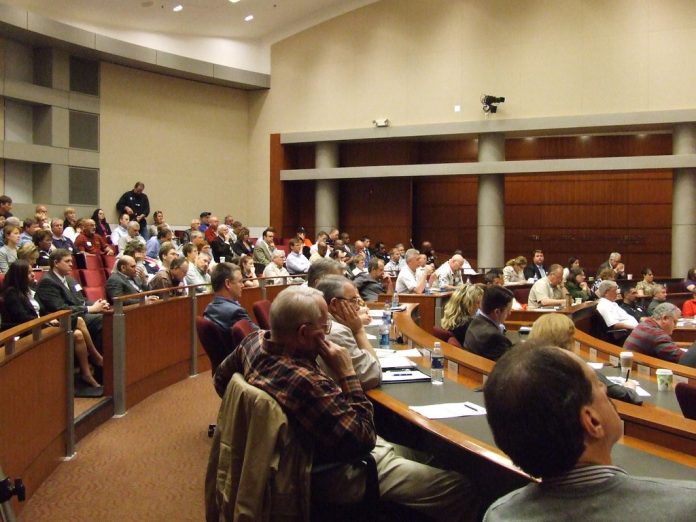By Margaret Menge
(The Center Square) – Both houses of the Indiana legislature voted Thursday to override Gov. Eric Holcomb’s veto of a bill that would allow legislative leaders to call the Indiana General Assembly back into session to deal with an emergency.
The vote in the House on Thursday morning was 59-26, with all of the yes votes coming from Republicans, and a total of 15 representatives excused.
In the Senate, all Republicans voted to override the governor’s veto except Sen. Liz Brown of Fort Wayne, the chair of the Senate Judiciary Committee, who was absent.
“I think it was appropriate,” said Sen. Linda Rogers, R-Granger, following the vote. “I always tell my constituents that I’m not saying he [Holcomb] is doing a great job or a bad job. I’m saying that a broader voice allows for better policy.”
Holcomb had vetoed the bill, House Bill 1123, on Friday, writing in a letter to Speaker of the House Todd Huston he believes the bill is unconstitutional.
“The legislation impermissibly attempts to give the General Assembly the ability to call itself into a special session, thereby usurping a power given exclusively to the governor under Article 4, Section 9 of the Indiana Constitution,” Holcomb wrote. “As such, it seeks to accomplish that which the Indiana Constitution clearly prohibits.”
He followed by writing that the bill violates the principle of separation of powers and is a “legislative encroachment” on the governor’s power.
He called the issue “a matter of immediate and substantial public interest” and said any legislative action taken during an emergency special session will be “void and thus open and subject to legal challenges to set them aside.”
In comments on the House floor Thursday morning, Huston tried to minimize any sense the General Assembly’s veto override amounted to a challenge to Holcomb’s authority, saying the bill applies to future situations, not the present one involving the COVID-19 pandemic.
HB 1123 is seen as a mild effort to blunt some of the criticism that the governor has overreached in his response to the COVID-19 pandemic, or perhaps a way to divert attention from stronger efforts, such as the resolutions sponsored by Rep. Curt Nisly, R- Milford, and another by Rep. J.D. Prescott, R-Union City, that would have immediately put an end to the state of emergency. The Nisly resolution has two co-authors, and the Prescott resolution has 34, together constituting more than half of the members of the Republican caucus in the House.
Nisly and Rep. John Jacob, R-Indianapolis, a co-author on the Nisly resolution, both voted no on the override.
“This is one of those weird confluence of events, where I actually agree with the governor,” said Nisly on Thursday afternoon. “I think the bill is unconstitutional…The leadership decides when we come in and what we can talk about, what we can discuss. It sounds like a special session, and that’s the governor’s job, not the legislature’s job.”
Nisly panned HB 1123.
“This was the bill that was supposed to rein in the governor, that’s what it was supposed to do, and it didn’t do any reining at all,” he said.
HB 1123 would allow the leaders of the House and the Senate to meet in a legislative council and call an emergency session of the legislature after the governor has declared a state of emergency that has a “statewide impact.”
During the emergency session, the legislature would only be able to pass bills related to the agenda set by the legislative leaders and those bills must be related to the state of emergency. They would have to adjourn in 40 days.
The bill was authored by the Republican floor leader, Rep. Matt Lehman, R-Berne, and by Rep. Ben Smaltz, R-Auburn, and had 47 co-authors, including Huston.
In addition to the emergency session provision, the bill would prevent the governor from spending stimulus money from the federal government, and require that the money be put into a fund controlled by the Indiana General Assembly.
Rogers said she and other senators have been frustrated that even though they’ve been in session for four months, the legislature has had very little input in the state’s response to the pandemic, which has included the stay-at-home order known as the “Hunker Down Hoosiers,” the forced shutdown of businesses declared “non-essential” – which included thousands of “mom and pop” stores but not big-box retailers like Wal-Mart – and also the closure of churches and a prohibition on elective surgeries.
“It’s hard when for 13 months you’ve had one person that has made all the decisions,” she said. “I’ve not spoken to him [Holcomb]. I’ve brought items to his staff, and, nothing comes of it. And we’re the ones who are out in our communities, meeting with our constituents, and they want answers.”
She said it’s been frustrating to not be able to answer questions about what the state is doing.
“Even now. It hasn’t changed,” she said. “I had told everybody, once we’re in session we’ll be able to make some additional decisions. But we were never really brought into the picture at all.”
Originally published by The Center Square. Republished with permission.











